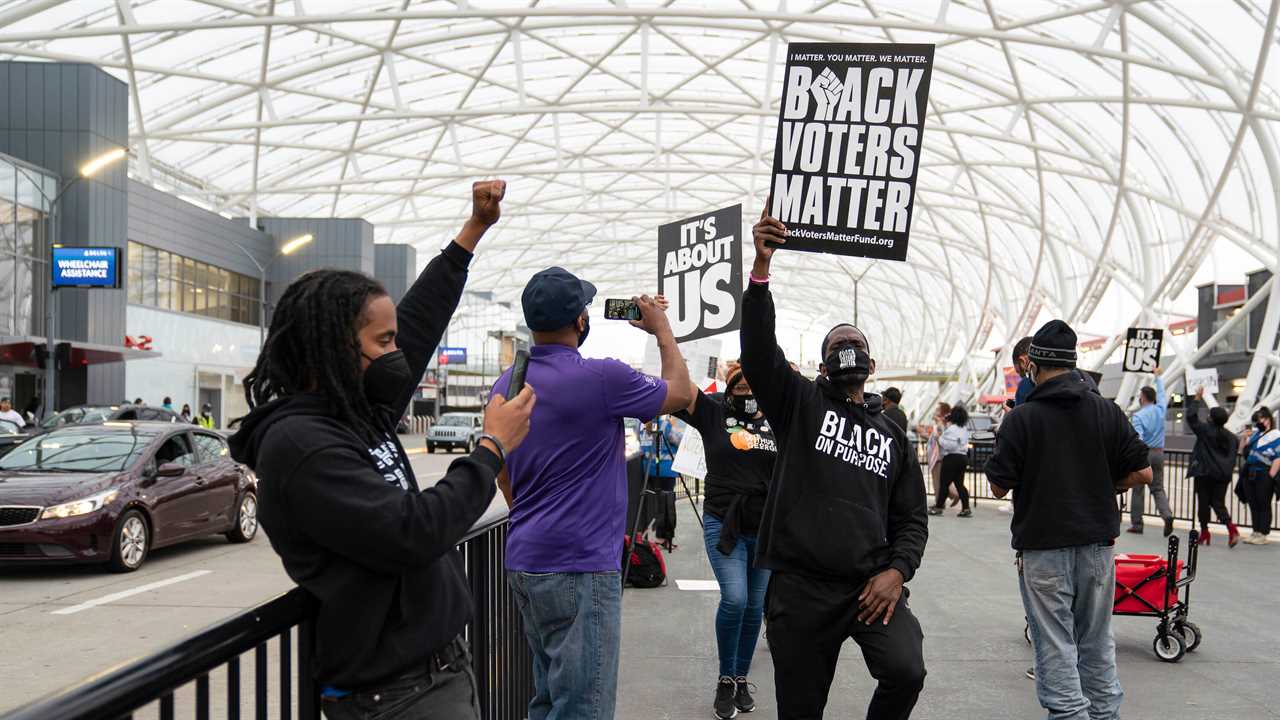
WASHINGTON — The Justice Department sued Georgia over a sweeping voting law passed by the state’s Republican-led legislature, Attorney General Merrick B. Garland announced on Friday, in a major step by the Biden administration to challenge state-level ballot restrictions enacted since the 2020 election.
“The rights of all eligible citizens to vote are the central pillars of our democracy,” Mr. Garland said in a news conference at the Justice Department. “They are the rights from which all other rights ultimately flow.”
The complaint accuses the Georgia law of effectively discriminating against Black voters and seeks to show that state lawmakers intended to do so. It says that several of the law’s provisions “were passed with a discriminatory purpose,” Kristen Clarke, the head of the department’s civil rights division, said at the news conference.
The lawsuit is among the most aggressive efforts to expand or preserve voter protections since the Supreme Court in 2013 overturned a key provision of the Voting Rights Act of 1965 that had allowed the Justice Department to stop states from passing laws viewed as facilitating voter discrimination.
It comes days after congressional Republicans blocked the most ambitious federal voting rights legislation in a generation, dealing a blow to Democrats’ efforts to preserve voting rights. President Biden and Democratic leaders pledged to continue working to steer federal voting rights legislation into law and to escalate pressure on states and Republicans, with Mr. Biden planning speeches in key states warning against a threat to the democratic process he has compared to Jim Crow.
The complaint also shows that the Biden administration intends to invoke the remaining tools the Justice Department has to aggressively fight state actions that it sees as potentially disenfranchising minority voters.
“This lawsuit is the first of many steps we are taking to ensure that all eligible voters can cast a vote, that all lawful votes are counted and that every voter has access to accurate information,” Mr. Garland said, calling on Congress to give the department more help.
Republicans in Georgia quickly cast the suit as a political move, noting that Mr. Biden and Democrats in the state, including the voting rights activist Stacey Abrams, have vocally criticized the law.
“Joe Biden, Stacey Abrams and their allies tried to force an unconstitutional elections power grab through Congress — and failed,” Gov. Brian Kemp said in a statement. “Now, they are weaponizing the U.S. Department of Justice to carry out their far-left agenda that undermines election integrity and empowers federal government overreach.”
Georgia was the center of President Donald J. Trump’s monthslong effort to overturn the election results. He seized on numerous false conspiracy theories about the election results there, insisting falsely that the outcome was rife with fraud even as three recounts and audits — including one conducted entirely by hand — reaffirmed the tally.
Passed in March, the Georgia law ushered in a raft of restrictions to voting access and sharply altered the balance of power over election administration. It sought to place strict restrictions on ballot drop boxes, bar election officials from proactively sending absentee ballot applications to voters, reduce the time to request absentee ballots and add identification requirements for voting by mail.
It followed an election in which Georgia, a once reliably conservative state, turned blue for the second time in 40 years in the presidential race and runoffs that flipped its Senate seats from Republican to Democratic. The law changed elements of voting that contributed to those Democratic victories. All were close victories attributable in part to Black voter turnout and the state’s voting options. The law has an outsize effect on Black voters, who make up about one-third of Georgia’s population and vote overwhelmingly Democratic.
“These legislative actions occurred at a time when the Black population in Georgia continues to steadily increase, and after a historic election that saw record voter turnout across the state, particularly for absentee voting, which Black voters are now more likely to use than white voters,” Ms. Clarke said.
Critics denounced the law as rooted in Mr. Trump’s falsehoods and accused state Republicans of seeking to undo the Democratic wave in Georgia. Mr. Biden called it an “un-American” attack on voter rights that amounted to “Jim Crow in the 21st century” and promised the Justice Department would look into it.
The lawsuit, filed on the eighth anniversary of the Supreme Court’s decision on the Voting Rights Act, known as Shelby County v. Holder, is an important milestone for the Biden administration, which has made voter rights one of its core issues.
Democrats in Washington are struggling to find an effective strategy for countering laws like Georgia’s that are advancing through more than a dozen Republican-led states this year. Party activists and policymakers have mostly pinned their hopes on narrow majorities in Congress, where Democratic leaders have insisted they will work through the summer to try to mass a meaningful expansion of voting rights and protections against election subversion tactics by partisan state officials.
Democrats have framed the battle as existential, and progressives are plotting a pressure campaign this summer to try to persuade senators to gut the legislative filibuster to allow them to act without Republican support. In the meantime, Senator Amy Klobuchar, Democrat of Minnesota, plans to take her influential Rules Committee to Georgia in the coming weeks to convene a field hearing homing in on criticism of the new law there.
This fall, lawmakers also plan to push to pass legislation to strengthen the Voting Rights Act, the statute invoked in Friday’s lawsuit. It would reinstate the provision struck down by the Supreme Court in 2013, which requires states with a history of discrimination to clear any voting changes with the Justice Department. The bill is likely to face opposition in Congress by Republicans, who argue that discrimination is no longer a factor in voting.






